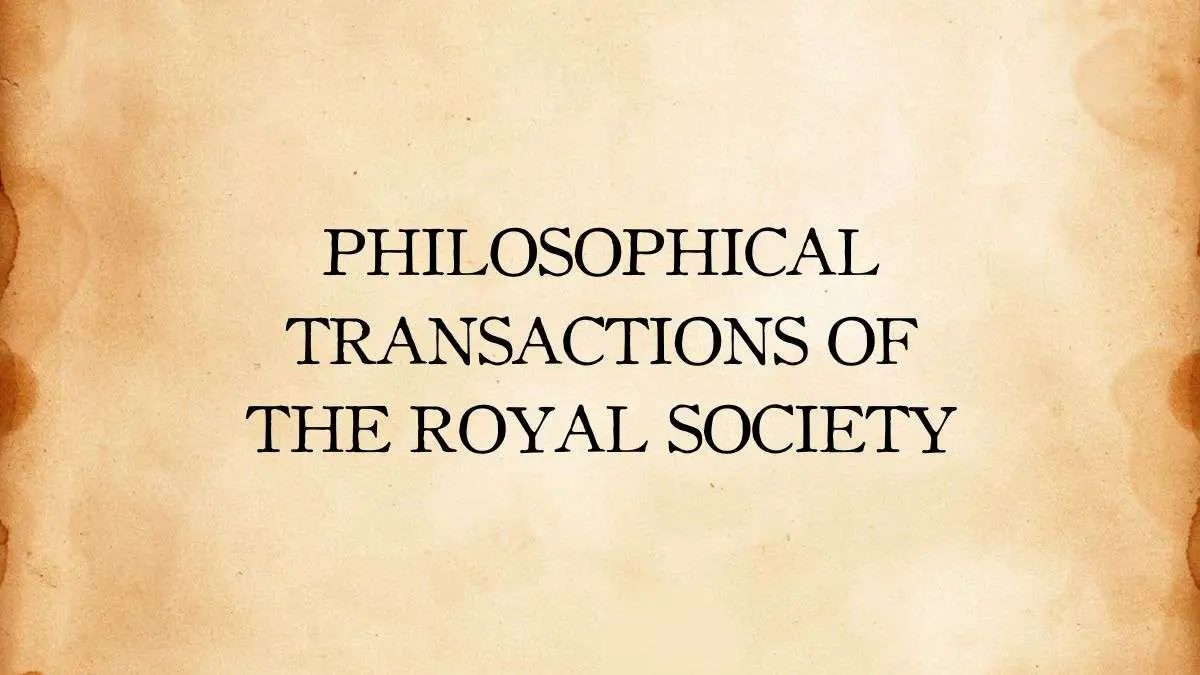Table of Contents
- Introducing Philosophical Transactions of the Royal Society
- The Significance of Philosophical Transactions Being the First Academic Journal
- The Evolution of Academic Journals
- Honoring the Legacy of the First Academic Journal
Introducing Philosophical Transactions of the Royal Society
The first academic journal published was Philosophical Transactions of the Royal Society. It was established in 1665 by the Royal Society of London (now the Royal Society) and remains the world’s longest-running scientific journal.
The groundbreaking journal’s founding gave scientists a formal medium to share their studies with colleagues worldwide. In the centuries since, academic journals have continued to evolve, but their core purpose remains – to propagate scientific understanding through rigorous peer review and open access to cutting-edge research.
The Royal Society was established in 1660 by prominent scientists and scholars in England, including Robert Boyle, Christopher Wren, and Robert Hooke. Its founding marked a pivotal moment in the history of science, providing a formal institution dedicated to scientific experimentation, collaboration, and communication.
The first publication of Philosophical Transactions was published on March 6, 1665. It was the world’s first scientific journal issue, allowing researchers to publish their findings quickly and widely.
The first issue, edited by Henry Oldenburg, the society’s first secretary, aimed to inform members of the latest scientific advancements from Britain and abroad. This groundbreaking publication allowed discoveries to circulate more rapidly among scientists.
Notable Early Contributors
Some notable contributors in the early issues included Robert Boyle, who published many articles on chemistry and physics; Robert Hooke, who wrote about his microscopic observations; and Antoni van Leeuwenhoek, whose pioneering observations of microorganisms were first reported in the journal. Their cutting-edge research published in Philosophical Transactions provided the foundation for today’s scientific knowledge in many disciplines.
The Significance of Philosophical Transactions Being the First Academic Journal
Philosophical Transactions were pivotal in advancing scientific communication and collaboration in the 17th and 18th centuries. As the world’s first academic journal, it provided a platform for scientists to share their discoveries and ideas with colleagues worldwide. This accelerated the pace of scientific progress and fostered a spirit of cooperation within the scientific community.
Facilitating the Dissemination of New Discoveries
One of the most significant contributions of Philosophical Transactions was enabling the rapid dissemination of new scientific discoveries. In earlier times, scientists often kept their findings secret or only shared them within their inner circles. The journal made it possible to broadcast innovations in science to a broad audience of fellow researchers.
Sparking New Ideas through Scientific Debate
In addition to distributing discoveries, Philosophical Transactions also provided a forum for scientists to debate theories, challenge prevailing notions, and propose new hypotheses. In the journal’s pages, Isaac Newton himself engaged in written debates with rivals like Robert Hooke and Gottfried Leibniz.
This exchange of ideas drove rapid advancements as scientists built on each other’s work. It also gave researchers critical feedback to refine their concepts and explore new directions of inquiry sparked by colleagues. Progress may have moved much slower without this platform for ongoing scientific discussion.
Shaping Modern Academic Publishing
As a pioneer in scholarly communication, Philosophical Transactions set essential precedents that continue to influence academic publishing today. It introduced concepts like editorial review, establishing the practice of subjecting papers to scrutiny before publication to ensure quality. The journal also invented the concepts of crediting authors and citing references to enable readers to trace the provenance of ideas.
By demonstrating the value of journals to scientific advancement, Philosophical Transactions paved the way for the proliferation of academic publications across all disciplines. Centuries later, researchers still rely on peer-reviewed journals to validate and share their work with the scientific community.
The Evolution of Academic Journals
Philosophical Transactions profoundly influenced the growth and development of academic journals across scientific disciplines. As the first academic journal to disseminate new research, it set a precedent for scholarly communication that inspired the launch of similar publications in fields like medicine, mathematics, and more.
In the 18th and 19th centuries, specialized academic journals began emerging across the sciences, often with direct inspiration from the model established by Philosophical Transactions. For example, influential medical journals like The Lancet and The New England Journal of Medicine can trace their origins to this early prototype for sharing research.
By demonstrating the value of a recurring, peer-reviewed publication for distributing discoveries, Philosophical Transactions paved the way for the now ubiquitous academic journal. Its long-running success proved that this format facilitated scientific collaboration and enabled researchers to build on one another’s progress across geographic distances.
The Transition from Print to Digital Formats
While Philosophical Transactions began as a printed journal, the digital age has allowed unprecedented access and visibility for scientific research. Long-past issues over 300 years can be browsed online through archives and databases.
This transition from print to digital has accelerated the pace of discovery and allowed findings to reach a global audience in real-time. One no longer must wait for the printing and shipping of physical issues. The internet has connected researchers worldwide and blown open doors for collaboration.
As one of the first academic journals, Philosophical Transactions established many foundational practices for scholarly communication, which are now being reassessed and transformed for the 21st century. The rise of preprint servers, open peer review, and interactive online formats represents an evolution in line with the journal’s original aim of spreading discoveries rapidly and widely.
Looking ahead, open access has the potential to accelerate the pace of innovation and allow scientific progress to benefit all of humanity. The following 350 years of scholarly communication will undoubtedly bring changes as meaningful as the launch of Philosophical Transactions in 1665.
Honoring the Legacy of the First Academic Journal
As we reflect on the enduring legacy of Philosophical Transactions, it is clear that this pioneering journal has made invaluable and ongoing contributions to the scientific community over the past 350 years. From the first issue, Philosophical Transactions established itself as a vital platform for disseminating discoveries and ideas across disciplines. Its pages featured groundbreaking research from leading thinkers.

The journal introduced key innovations like peer review, which helped to uphold scientific rigor and objectivity. Over time, Philosophical Transactions also influenced the development of scholarly communication practices we now take for granted – the formal research article, scientific citations, and even the concept of scientific publishing.
